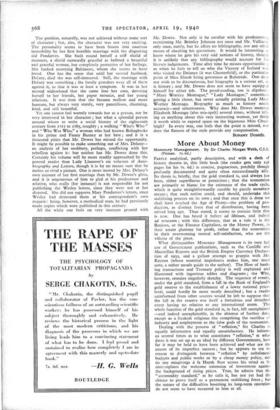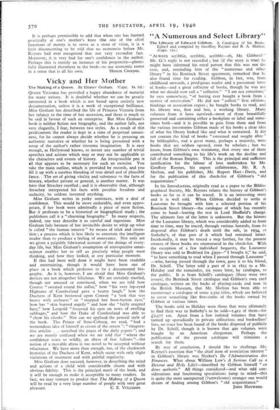More About Money
Monetary Management. By Sir Charles Morgan Webb, C.I.B, (Pitman. 7s. 6d.) PARTLY analytical, partly descriptive, and with a dash of history thrown in, this little book (the reader gets only 146 pages for his 7s. 6d.) is concise, pugnacious, patchily though profusely documented and quite often extraordinarily silly. Its thesis is, briefly, that the gold standard is, and always has been, either superfluous or pernicious ; that the economists are primarily to blame for the existence of the trade cycle, which is quite straightforwardly curable by purely monetary means ; that each nation could, and should, undertake this stabilising process on its own ; and that once this is done we shall have reached the Age of Plenty—the problem of pro- duction, as distinct from that of distribution, having been solved long ago. Thus stated, it seems to contain little that is new. One has heard it before ad libitum, and indeed ad nauseam ; with this difference, that as a rule it is the Bankers, or the Finance Capitalists, or the Money Power, in their astute gluttony for profit, rather than the economists in their overweening mental self-satisfaction, who are the villains of the piece.
What distinguishes Monetary Management is its very full use of Government publications, such as the Cunliffe and Macmillan Reports and the British Empire Currency Declara- tion of 1933, and a gallant attempt to grapple with Mr. Keynes (whose essential impishness makes him, one must note, a rather unsafe guide to the author). The How of bank- ing transactions and Treasury policy is well explained and illustrated with ingenious tables and diagrams ; the Why, however, remains singularly sketchy. The sequence of events, under the gold standard, from a fall in the Bank of England's gold reserve to the establishment of a lower national price- level, could hardly be more neatly described ; but a reader uninformed from other sources would be left to suppose that the fall in the reserve was itself a fortuitous and detached event having no relation to any international norm. The whole function of the gold standard is, in fact, left unexplained —and indeed unexplainable, in the abience of further data, except as a freakish religious rite• comprising the sacrifice of industry and employment to the false gods of the economists.
Dealing with the process of " reflation," Sir Charles is equally informative and equally unsatisfactory. He informs us several times as to what constitutes "reflation," at what dates it was set up as an ideal by different Governments, .how far it may be held to have been achieved and what are the causes of its imperfect success ; but he appears to see no reason to distinguish between " reflation " by unbalanced budgets and public works or by a cheap money policy, nor do any misgivings a la Hayek float across his mind as he contemplates the welcome extension of investment against the background of rising prices. True, he admits that the " commodity standard," as he calls it, has not yet had the chance to prove itself as a permanent stabilising force; but the nature of the difficulties besetting its long-term operation do not seem to have occurred to him at all.
It is perhaps permissible to add that when one has learned practically at one's mother's knee thin one of the chief functions of money is to serve as a store of value, it is a little disconcerting to be told that no economist before Mr. Keynes had ever recognised that not very recondite fact. Moreover, it is very bad for one's confidence in the author. Perhaps this is merely an instance of his propensity—plenti- fully illustrated elsewhere in the book—to use economic terms











































 Previous page
Previous page